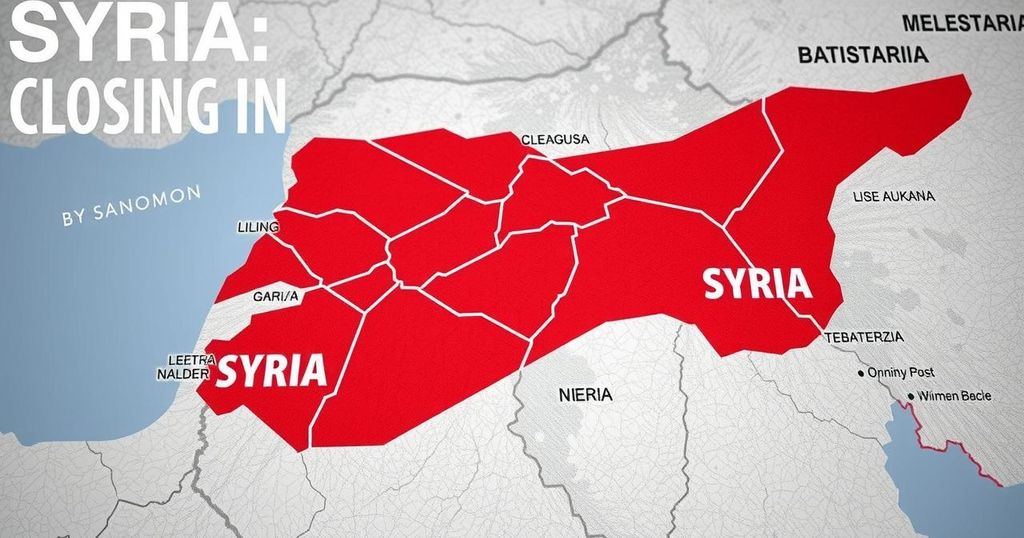World news
AL - ASSAD, AL QAEDA, ASIA, BASHA, BASHAR AL - ASSAD, CEASEFIRE, CIVILIAN CASUALTIES, CONFLICT, DAMASCUS, DEIR AL - ZOUR, GAZA, GAZA STRIP, GOLAN HEIGHTS, HAYAT TAHRIR AL - SHAM, HOMS, ISRAEL, JERUSALEM, JORDAN, LEBANON, MIDDLE EAST, MILITARY OPERATIONS, NORTH AMERICA, PHILIPPINES, RAJA ABDULRAHIM, RAJA ABDULRAHIM THOMAS FULLER, SYRIA, THE TIMES, UNITED NATIONS, UNITED STATES, WAR
Jamal Robinson
0 Comments
Syrian Rebel Advances Prompt Border Closures Among Nervous Neighbors
Syrian rebel forces are advancing toward Homs and Damascus, prompting Lebanon and Jordan to close border crossings and Israel to reinforce military presence in the Golan Heights. The Syrian civil war, marked by prolonged stalemate and shifting power dynamics, faces renewed challenges to President Bashar al-Assad’s control, with a Kurdish-led force making gains in Deir al-Zour.
Recent developments in Syria have escalated tensions in neighboring countries as rebel forces continue their advance toward significant urban centers such as Homs and Damascus. In response to these territorial gains, both Lebanon and Jordan have opted to close their border crossings, while Israel has increased its military presence on the Golan Heights. This shift underscores the growing alarm regarding the stability of the region, particularly as President Bashar al-Assad’s regime faces increasing challenges to its authority. Meanwhile, a Kurdish-led force backed by the United States has also made significant inroads in Deir al-Zour, a city previously under government control, further illustrating the diminishing power of the Assad government.
The coalition of armed groups advancing in Syria is primarily led by Hayat Tahrir al-Sham, an entity that was once affiliated with Al Qaeda. Despite its efforts to distance itself from its past associations and achieve some form of international recognition since splitting from Al Qaeda in 2016, the group remains classified as a terrorist organization by various global entities, including the United States and the United Nations. The recent military successes of these factions have re-ignited discussions about the protracted conflict that has unfolded in Syria, which had previously received lesser media attention relative to conflicts in Gaza and Lebanon. Despite multiple diplomatic attempts over the years, a political solution to the Syrian crisis has yet to be realized.
The Syrian civil war, which began in 2011, has resulted in a complex array of factions vying for control and power. The Assad regime has long faced challenges from various rebel groups, each with differing ideologies and goals. The ongoing conflict has seen external powers engaged both directly and indirectly, complicating the situation further. The recent shifting of military power dynamics highlights the fragility of President Assad’s government, as it loses control over key areas within the country, prompting immediate concerns from adjacent nations about potential instability spilling over their borders. The continued stalemate in diplomatic negotiations contrasts sharply with the rapid developments on the battlefield.
In summary, the recent advances by Syrian rebel groups toward key cities signify a pivotal moment in the ongoing conflict, with potential repercussions for neighboring countries. The closure of borders by Lebanon and Jordan, alongside Israel’s military enhancements, illustrates the heightened fears over regional stability as Assad’s authority wanes. Additionally, the involvement of diverse factions in the civil war, coupled with the historical context of the Syrian crisis, emphasizes the complexity of reaching a sustainable resolution to this protracted conflict.
Original Source: www.nytimes.com




Post Comment